Solace State's Exploration Of Power Dynamics And Queer Love Is My Favorite Cyberpunk Story This Year
Solace State is an experience where you'll be glad the game doesn't give you a time limit on dialogue choices.
The fall season is well and truly upon us, with tons of games releasing at a pace that I can barely keep up with. If you're similarly struggling to stay afloat with everything, you may have missed the release of Solace State--a visual novel roleplaying game in which you play as Chloe, a woman born as a genetic anomaly who can hack into the minds of other people to aid her efforts in navigating the cyberpunk-inspired world she calls home.
Though also visually stunning, Solace State's beauty lies in its story-- a compelling adventure about queer people of color being drawn into a conspiracy that threatens to plunge an entire country into a dystopian nightmare. It's a game that is both thoughtful and complex, encouraging you to stop and weigh the cost of rebellion against the risk of corporate hegemony, and it's also one of my favorite games of 2023.
I sat down with Solace State executive producer and director Tanya Kan to discuss how the game came together and the decision process behind stepping away from the neon lights, laser swords, and similar imagery to better promote the hacktivism ideals of cyberpunk. We also talked about the game's 38 endings--namely, which one people may want to avoid--and the agency given to the three romance options that Chloe can pursue. The game is available for Xbox Series X|S, Xbox One, and PC.
What was the inspiration for Solace State? Both story-wise and presentation-wise.
I think it was really drawn from my eclectic education background in political science and cinema studies. And from that, actually, it was really such a passion for me to understand how power dynamics work at a macro level. I know that's such an academic answer, in a way, but it's really just about juicy, juicy stories of asking, "How do we deal with things like inequality and the concerns of our time? How can we look at the nuances of philosophies when they're very, very different because we all come from different places? How do we find those things that unite us?"
From my background, I really loved looking at the cinema for that, at first, because I actually wasn't allowed to play video games when I was a kid. I had to focus on my studies. In many ways, I feel like a lot of the things I learned--from how I look at different cities and what they offer--often go through the lens of cinema. Later on, when I was allowed to play games in university, I was able to explore ideas of philosophy and how friendships align with each other through entertainment media.
So that was really at the heart of it, asking, "What does entertainment media teach us about power dynamics? What do they teach us about hegemony?" Of course, games like BioShock, often do look at that quite deeply, and, of course, Disco Elysium.
A lot of non-fiction writing influenced Solace State as well. For example, The Abolitionist Movements in the US helped inspire me, as well as better understand different power dynamics. I want to be part of empowering others to participate and understand why that's important. I think there's so much that the Asian community or immigrant communities owe to Black movements. And it really got me thinking, "Okay, how do we share knowledge back? How do we support each other?"

Do you see a relationship between your own feelings about work and the meaning and purpose of protagonists in your game? Does it feel dissonant? A fantasy of purpose?
Chloe, to me at least, does take on a slightly more naive approach. I did draw from me for a lot of the discussions of intergenerational trauma she has and that was a really difficult writing process. Chloe's abilities to be able to hide in plain sight ties into a desire to escape a lot of violence toward East Asian individuals. There's definitely a desire to just disappear into some other body. And the sense of wanting to hide away and not be yourself but be a different ID, is also in a way part of my journey of queerness as well. So I would say, without me realizing it when I first wrote Chloe, I was just like, "I'm ignorant about all of this. I'm just going to write, I really want to write her falling in love with a woman." I don't know what that means. Let's not talk about it.
So there are definitely elements about being queer and exploring that, where I pulled in some of my vulnerabilities to make and shape her. I do feel like there is, in many ways, an idealism to her. Her storyline is optimistic at the end of the day, but I think it really ties into this idea that there are terrible things happening. And she's able to stare into that and get past that and still thrive as much as her friends. She has that group of friends around her.
And I can't help but read the news. I can't help but feel for the news, feel that tragedy and feel hopeless. Where can I go with that? What is my outlet? So I think Chloe became that little bit of an outlet. And some of the other characters, as well. It's really how I worked all of them.
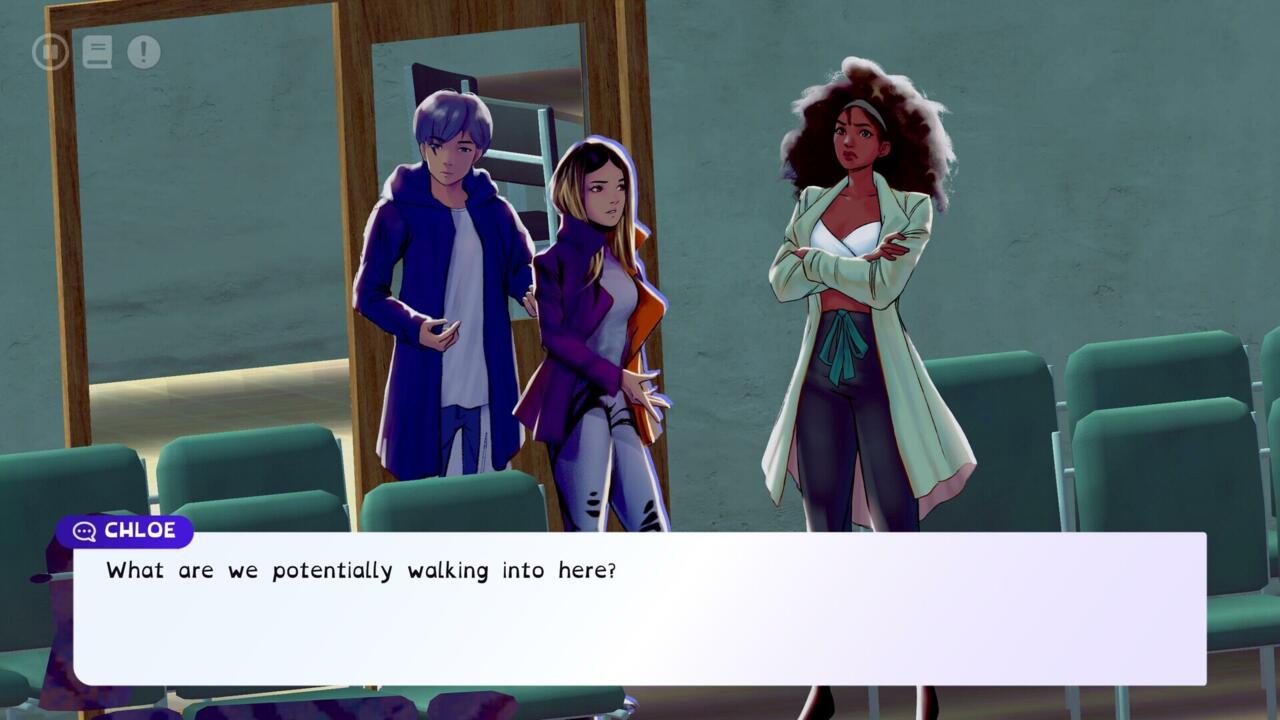
You've already touched on your inspirations for giving Chloe the ability to go anonymous and hide in other people's identities, but what drew you to giving her the ability to almost instantly gather information on anyone she wants just by looking at them?
I think it really goes to the idea of power dynamics shifting a lot in cyberpunk. At the beginning of creating the narrative, I really had to work with the idea of, well, you have this hegemonic system. The system is so big. How do I give someone the power to figure things out in such a giant, seemingly monolithic system without going in guns blazing and sword fighting and all of those things?
We need information in order to make rational decisions in political structures. But what if you're not just making rational decisions? What if they're emotional too? And I think that's where I really wanted to emphasize that a lot of political actions are actually also very emotional. They're tied to how you feel about home and family. They're tied to how you feel about friends and neighbors. Tied to society and culture. All of these things make up the landscape of how you react to something.
One of the first scenes that was written was really the scene of the confrontation between Chloe, Phin, Torrent, and Sueli. It's really only between Sueli, Torrent, and Phin because Chloe's behind the scenes gathering information from Phin, a cop, to feed to Torrent. How do you get that information across? Torrent is the one role-playing all of this, but at the same time, you get this flood of information. Are you sympathetic to Phin? Do you hate him and use what you learn about his mother to shame her and him in front of everyone? Obviously, I can't predict how other people are going to respond--the death of the author and all that--so people will bring in their own interpretations.
So I think playing around with all of those elements of Phin not having healthcare and so forth, we really just wanted to emphasize that Chloe can't make the perfect decision. All of the decisions are so difficult to make, but we're going to arm her with certain tools to examine this in a little bit more detail and in a way that allows us to make really quick global decisions on the fly. And there's also consent as well. If you have a superpower--and I think every superhero has to deal with this in some way, regardless of how benign their power is--how do you navigate that? What are your limitations of control? You can look at the power dynamics between, say, for example, Chloe and [her ex-boyfriend] Alden. Alden clearly has a lot more social power and a lot more everything. More privilege. But Chloe can instantly flip the script because she can hack into his mind and know how he's feeling and what he's thinking. It's good to challenge power like that but Chloe could easily be a bad guy if she's not careful.

Aesthetically, Solace State doesn't match what many associate with the cyberpunk genre, focusing on characters' interactions over the flashing neon lights and Asian-inspired imagery.
We really did go for a deconstructed cyberpunk for sure. And I think we said, "Hey, what happens if we take away all the neon lights and make cyberpunk into daytime?" Because the dystopia, I think, for marginalized individuals is already here. We're living it from our nine to sevens working. We didn't want to emphasize that cyberpunk stories only happen at nighttime when it's cool and you're able-bodied so you can enjoy the clubs. We are almost telling a story where it's a precursor to the really, extremely dystopic Children of Men level of dystopia. Sometimes I've been calling it pre-dystopic or something like that. But at the end of the day, marginalized peoples are already living with the limitations of, or the costs of surveillance. The cost of having medicine tied to their workability, where their health is tied to that, or their home being tied to that, means their ability to have the dignity of creating art is taken away, even if they're doing everything right.
We wanted to get away from just the invisibility of people of color or, specifically, women as activists in many modern-day depictions of cyberpunk. I just don't see that much media effectively putting women of color at the forefront of a movement or making them what sustained a movement. So that's one thing that was really important to me to highlight that we're not just the model minority, that everyone has a stance.
And I think queerness is so much part of that aspect as well. Queerness is at the core in exploring and making sure that there are spaces for people to thrive. And I don't always see it emphasized as well that there's an overwhelming representation actually of people who are LGBTQ and marching along with different movements in history, but that is actually what it is at the end of the day, even if they don't outright come out and say, "Hey, I'm LGBTQ and I'm marching with the labor movement because I care about temporary workers' rights or sex workers' rights." They're not emphasized, but they are very clearly there and therefore should be represented.
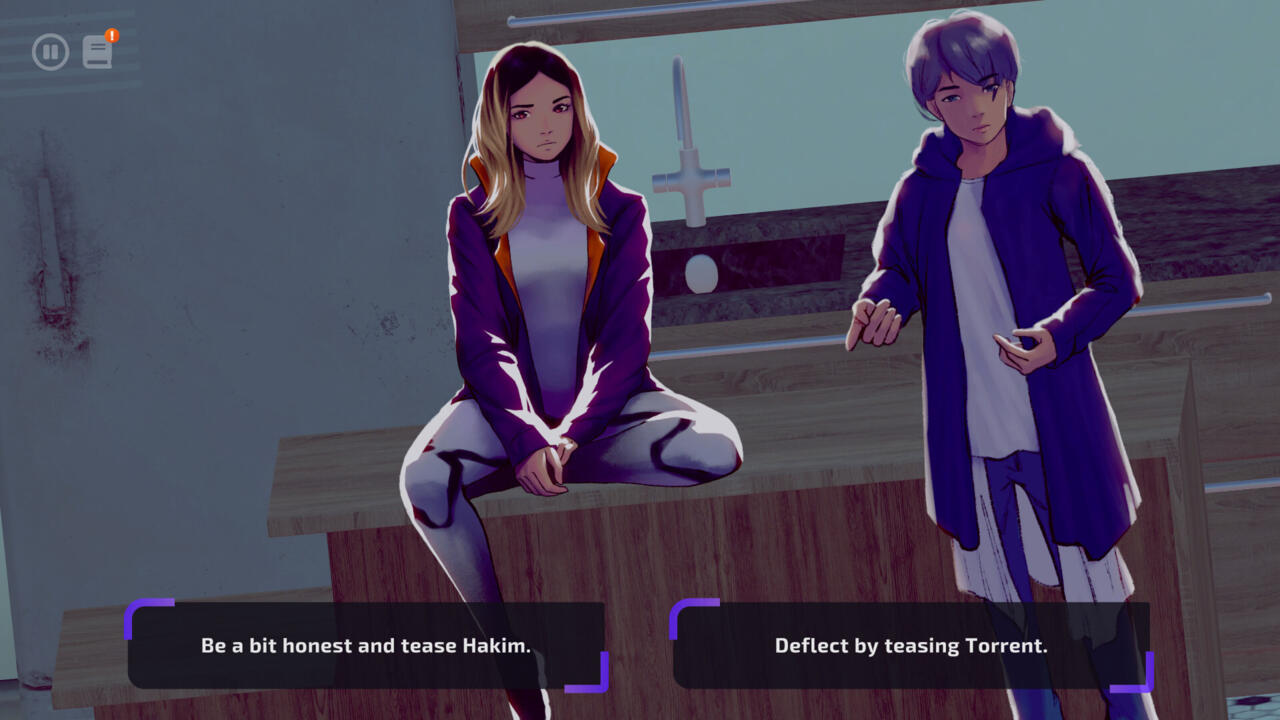
Does the game have, in your mind, a fail state? An outcome where the player has not adequately achieved their goals and they should replay the game and try again?
I think one moment that might disappoint people would be that you've created a great camaraderie with Sueli--it's obvious that you're both into each other--and then at a crucial moment you say, "Let's just reform."
So it's true that sparks are flying, but at a certain moment, she's going to be like, "I'm sorry, I can't be in a relationship with you." And she'll ask, "Well, do you want to still hang out?" We have a lot of branches at that moment. And if you are defensive about it, then she's like, "Look, these are my boundaries. This is what I'm comfortable with. Hanging out with you is fine. I'm okay with friends who disagree with me, but in a romantic relationship, I want to be with someone with my values. And I don't want just one night." So she's really setting those boundaries.
And it took me a long time to write this. I was like, "Oh, what if people don't like this?" But then I think at the end of the day, it speaks to her strength of character. And I think if I met someone like that, I'd just say, "Oh, this is great. Thank you. Thank you for respecting me with telling me that to my face."
And I think I just gave away who I really like the most! They're all great. All three romance options are great choices. But yeah, that one really stood out to me because of how many different ways that conversation can influence the relationship's outcome.
As we wrap up, is there anything you would like to add?
As a final note, we really do think it's a little bit more of a hacktivism game than necessarily a romantic one, but the personal is political in this case--we really wanted to emphasize that aspect of intersectionality and how personal relationships are such an informed part of any movement.
This interview was edited for both brevity and readability.
Got a news tip or want to contact us directly? Email news@gamespot.com
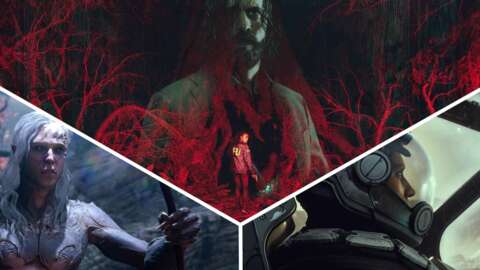
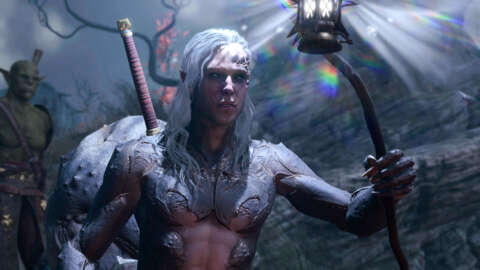

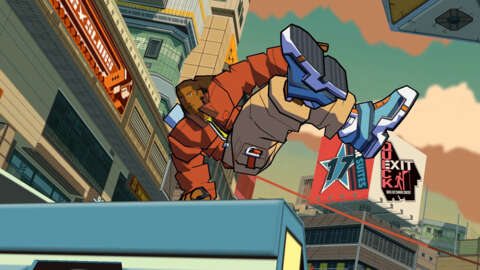



Join the conversation